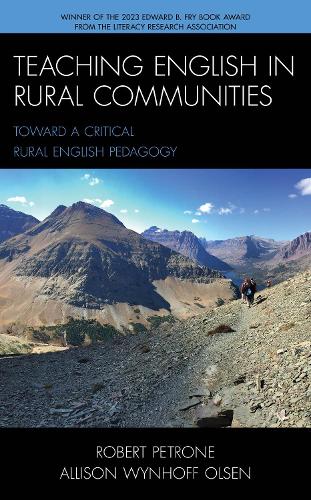
Teaching English in Rural Communities: Toward a Critical Rural English Pedagogy
(Paperback)
Publishing Details
Teaching English in Rural Communities: Toward a Critical Rural English Pedagogy
By (Author) Robert Petrone
By (author) Allison Wynhoff Olsen
Bloomsbury Publishing PLC
Rowman & Littlefield Publishers
1st April 2021
United States
Classifications
Professional and Scholarly
Non Fiction
Rural communities / rural life
Teaching of a specific subject
Educational: Language, literature and literacy
428.00712
Physical Properties
Paperback
182
Width 153mm, Height 230mm, Spine 14mm
281g
Description
Showcasing the voices, perspectives, and experiences of rural English teachers and students, Teaching English in Rural Communities promotes equity, diversity, and inclusivity within rural education. Specifically, this book develops a Critical Rural English Pedagogy (CREP), which draws attention to issues of power, representation, and justice related to rurality. Based on the assumption that rurality is a social construct, CREP critiques deficit-laden stereotypes and renderings of rural places and people that circulate in media, popular discourse, and even education at times. In doing so, CREP opens up possibilities for educators and students to use the English classroom as a space to better understand the complex issues they face as rural people and ways to promote more nuanced and comprehensive representations of rurality. In particular, this book highlights English rural classrooms whereby students examine representations of rurality in literary and media texts; decenter dominant settler-colonist narratives of rural spaces, places, and people; develop understandings of Indigenous perspectives and cultural practices, particularly related to land stewardship; and engage in local outreach to promote inclusivity within rural communities. This book also gives special attention to ways race and racism may factor into literacy education in rural contexts and possibilities for rural educators to attend to these issues.
Reviews
As an African American educator who grew up in a rural setting and whose family history is tied to the rural Midwest, I welcome a study like Teaching English in Rural Communities. Petrone and Wynhoff Olsen dont write about rural folks; they write with them and for them in this enlightening work. Offering an approach to teaching English to rural students that helps them to critically engage and confront constructions of rurality that demean and devalue their own experiences and identity, this book shows us the ways that rural English teachers are already empowering their students to see themselves as vital and important thinkers, acters, and citizens. In a cultural moment when the rural/urban divide seems as profound as ever and rural spaces are dismissed as nowheres whose only value lies in what they can provide for cities, Petrone and Wynhoff Olsen emphasize a place-based pedagogy that encourages rural students to develop a critical awareness of their own identities, the places where they live, and how both are perceived culturally. Most importantly to me, Petrone and Wynhoff Olsen embrace the diversity of rural experience, highlighting decolonizing pedagogies that recognize the sovereignty of indigenous people and their land and acknowledging the existence of BIPOC folks in rural spaces. Resisting the conflation of whiteness and rurality, this study demonstrates the ways that Critical Rural English Pedagogy can provide a powerful challenge to popular conceptions of rurality through the deployment of a critically-engaged, decolonizing English curricula. -- David Todd Lawrence, Associate Professor of English and American Culture and Difference, University of St. Thomas, and author of When They Blew the Levee: Race, Politics, and Community in Pinhook, Missouri
Teaching English in Rural Communities offers insights and explorations into what is often left out or omitted from conversations on educational reformRural Communities. Relying on Critical Rural English as a way to teach, learn and grow, co-authors Robert Petrone and Allison Wynhoff Olsen amplify the voices of educators as well as students in rural communities in Montana in an effort to better understand the complexity of such schooling settings as well as to offer a more transformative path forward for all involved. Such an exploration is complex; however, this contribution offers concrete lessons as well as observations of what it means to teach and learn at the intersections of race, racism, and rurality or rural education. -- Timothy San Pedro, Associate Professor of Multicultural & Equity Studies at The Ohio State University and author of Education in Movement Spaces: Standing Rock to Chicago Freedom Square and Applying Indigenous Research Methods: Storying with Peoples a
Teaching English in Rural Communities comprises first and foremost some great narratives of pedagogies in place. Bringing together theories of critical literacy, race and place conscious pedagogies the authors provide a series of wonderful nuanced accounts of pedagogical practices which attend to who and where people are teachers, students and the communities. This is a book to share with English teacher educators, teachers and literacy researchers who are deliberately working towards racial and spatial justice and with care for the planet. -- Barbara Comber, Interim Dean of Research, Education Futures, University of South Australia and Author of Literacy, Place, and Pedagogies of Possibility
Author Bio
Robert Petrone is associate professor of literacy education and critical youth studies at the University of Missouri. His research focuses on the intersections of learning and literacy in youth cultures, textual representations and theoretical reconceptualizations of adolescence/adolescents, and English (teacher) education. He is coauthor (with Sophia Sarigianides and Mark A. Lewis) of Re-thinking the Adolescent in Adolescent Literacy.
Allison Wynhoff Olsen is associate professor of English education, writing, and linguistics at Montana State University, where she is also a director of the Yellowstone Writing Project. Her current research includes explorations of rural English teaching, with a focus on learning over time, teachers emotional strain, and pre-service teacher preparations; examining intersections between talk and writing; and a development of a particular kind of argument, a listening argument.
